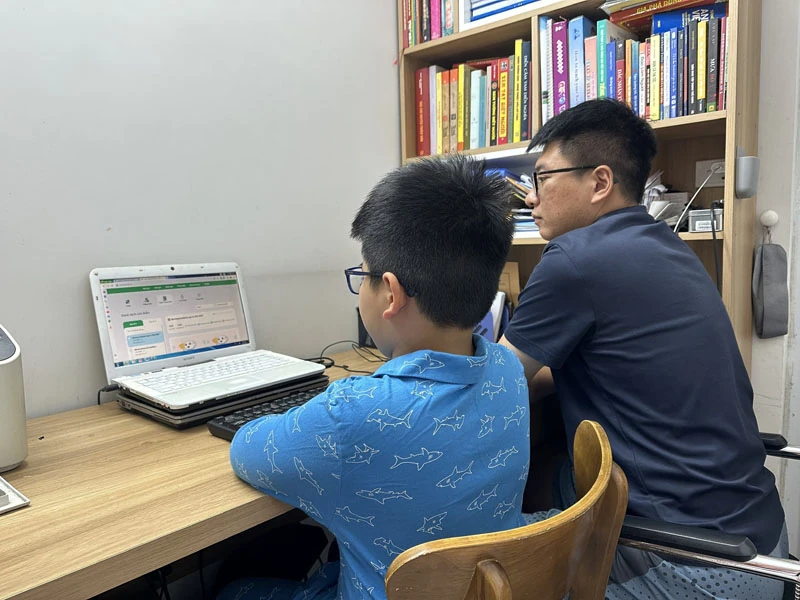
Parents, please accompany your children to master technology.
Today's young generation is growing up in a digital environment - where knowledge, information and connection opportunities are expanding like never before. With just a smartphone or tablet, children can learn foreign languages, find solutions, study tutorial videos or learn about the world, practice creative skills, and access human knowledge in just a few steps. Technology brings clear benefits, helping children learn flexibly, develop independent thinking, and get used to the digital trend, the foundation of the future.
However, along with these opportunities come many unpredictable risks. Cyberspace opens up a vast world , but also hides many pitfalls, such as: misinformation, cyber violence, harmful content, video game addiction, behavioral deviations and decreased social interaction.
There is no denying that digital technology has changed the lifestyle of every family. In many places, the image of children sitting for hours in front of a phone or tablet screen has become familiar. Many young children spend hours on their phones, while the time for exercise, reading or talking with their parents is getting less and less.
Many parents share that their phones sometimes become their “best friend” or “involuntary babysitter” when they are busy with work. Some are confused and lack digital skills, do not understand cyberspace, do not know how to set device usage limits, control content or talk to their children about internet safety. Meanwhile, children are increasingly proficient in technology, causing the gap between the two generations to widen.
Mr. Le Huu Phuong, 45 years old (Hac Thanh ward) always struggles to find ways to manage his children on the internet, said: "Technology changes frequently and I am not proficient. To limit my children from watching YouTube, I set up content restrictions and viewing time, but my children still ignore the settings and watch beyond my time and management."
Dr. Hoang Thi Kim Oanh, Head of the Department of Cultural Management, University of Culture, Sports and Tourism, said: “Parents today need to shift from a “controlling” mindset to a “companionship” mindset, listening, guiding, and respecting their children’s personalities. In cyberspace, parents need to be their children’s “digital companions”, guiding them to use the network safely, identify harmful information and online behavior culture, and avoid dependence on technology. Instead of banning their children from using social networks and the internet, parents can guide and analyze content with their children to help them know how to evaluate right and wrong information, so that they can be more proactive and safe in cyberspace.”
It is the companionship that helps children develop the skills of self-control and information selection, instead of being imposed. Many parents have changed their thinking in educating children: from banning to accompanying. The hours of accompanying children not only help parents understand their children better but also help children learn how to use technology responsibly.
Ms. Nguyen Thi Hoa (Dong Quang ward) after a long time of banning her child from using smart devices and the internet, she discovered that this method was ineffective, her child still secretly used it. Ms. Hoa shared: “I realized that my child grew up in the digital age, it was impossible to ban him from accessing the internet and banning it was also ineffective. I tried to change the method, watching together, talking with my child about what he liked, then directing him to channels to learn foreign languages and explore science. Surprisingly, my child was more proactive, less drawn into useless games.”
As for Ms. Nguyen Thi Nguyet (Hac Thanh ward), she has proactively used the internet to support her child's learning. Ms. Nguyet shared: "Every time she studies English or reviews for online exams, she is allowed to use an iPad or computer. On weekends, she is allowed to use it for 45 minutes a day to watch YouTube and access TikTok under my supervision. Now that AI is popular, I see my child using it to guide math problems. I do not forbid her, but observe her usage to guide her. Thanks to that, she always shares with me the new technologies and applications she knows."
Master of Psychology Pham Thi Thu Hoa, Faculty of Education, Hong Duc University, said: “In the current social development, child care and education need to be recognized and evaluated comprehensively and seriously. Parents need to understand the psychological characteristics of their children in each period and age to have appropriate measures of influence. In particular, parents need to be close to their children, guide and support them in the context of many social changes, children are simultaneously affected by many factors, including both positive and negative".
Technology itself is neither good nor bad, the problem lies in how people use it. Therefore, the role of parents in the digital age has become more important than ever. Parents are not only managers, but also companions, helping their children master technology to grow up safely, confidently and more compassionately in the digital world. And that, accompanying children does not mean letting them do whatever they want, but establishing principles with them, experiencing, exploring together, and taking responsibility for time, content and behavior in cyberspace. That is management and companionship combined in parallel and implemented with understanding, not by command.
Article and photos: The Son
Source: https://baothanhhoa.vn/cha-me-thoi-cong-nghe-so-quan-ly-hay-dong-hanh-268100.htm







































































































Comment (0)